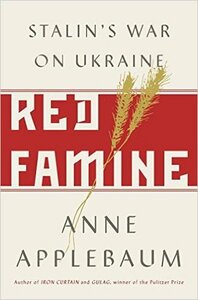Take a photo of a barcode or cover
dark
informative
reflective
sad
medium-paced
challenging
dark
informative
sad
slow-paced
Graphic: Animal death, Child death, Death, Genocide, Hate crime, Torture, Xenophobia, Antisemitism, Cannibalism, Deportation
dark
emotional
informative
lighthearted
reflective
sad
fast-paced
It's hard to know where to start with this one. While the Nazis' crimes have been well documented and turned into films, books, comics, and so on, the crimes of the communists see, to be given a pass, somehow. Stalin isn't seen as being anything like as bad as Hitler, partly because people assume he was trying to do something good, partly because, having started the second world war on Hitler's side they eventually wound up on the winning team by the end and are quite happy to take all the glory. But mostly, I think, because they were able to hush up a lot of what they were doing, or convince otherwise sensible people in the west to act like it never happened.
This book is a great antidote to that - it really is a jarring read: the insane goals, the lack of respect fo individuals, the willingness to turn neighbours on each other in order to annihilate millions of people by starvation, and the absurd dogmatism that replaced all sense of decency. At one point, people are viewed as criminals simply for being alive - because how can they be alive unless they have "hoarded" food? And so being alive becomes a crime punishable by death.
And why does this matter? Well, a couple of reasons, really: the first is the obvious one - Putin's methods against Ukraine now are eerily reminiscent of Stalin's tactics then. The other reason is that communism is making a comeback. We've done a great job in educating children on the evils of nazism but we haven't taught this stuff, and as a result there's a weirdly high number of young people who are describing themselves as communists, as though that's somehow better than being a nazi. Which... well, maybe it is, but not bloody much!
This book is a great antidote to that - it really is a jarring read: the insane goals, the lack of respect fo individuals, the willingness to turn neighbours on each other in order to annihilate millions of people by starvation, and the absurd dogmatism that replaced all sense of decency. At one point, people are viewed as criminals simply for being alive - because how can they be alive unless they have "hoarded" food? And so being alive becomes a crime punishable by death.
And why does this matter? Well, a couple of reasons, really: the first is the obvious one - Putin's methods against Ukraine now are eerily reminiscent of Stalin's tactics then. The other reason is that communism is making a comeback. We've done a great job in educating children on the evils of nazism but we haven't taught this stuff, and as a result there's a weirdly high number of young people who are describing themselves as communists, as though that's somehow better than being a nazi. Which... well, maybe it is, but not bloody much!
Слава Україні.
Sláva Ukrayíni.
Glory to Ukraine.
Sláva Ukrayíni.
Glory to Ukraine.
As with every book on Ukraine I’ve read, it is impossible to look at a single period in history alone, but you must go back decades and then forward decades to fully grasp the what, whys, and hows. In this history we tackle the Holodomor (Ukrainian famine or genocide) and its continued impact on the country and the world today. With an excellent mix of good research writing and personal accounts, Applebaum deftly brings together the political actions with the horrors of what those actions meant to individuals and then succinctly explores why and how it still matters. I imagine she will include an additional epilogue in the next publication bringing in the full-scale invasion of Ukraine in 2022–although the current epilogue lines up her thinking well enough for the reader to make connections on their own.
dark
emotional
informative
sad
medium-paced
"Truth shall overcome evil."
Applebaum's investigation into the horrific Ukrainian famine of the 1930s--the intentional negligence and bad choices, all in pursuit of a wicked ideology, that led to the unnecessary deaths of millions--helps us on our way towards truth and thus away from evil.
Applebaum's investigation into the horrific Ukrainian famine of the 1930s--the intentional negligence and bad choices, all in pursuit of a wicked ideology, that led to the unnecessary deaths of millions--helps us on our way towards truth and thus away from evil.
To difficult and upsetting to read on holiday
challenging
dark
emotional
informative
reflective
sad
medium-paced




